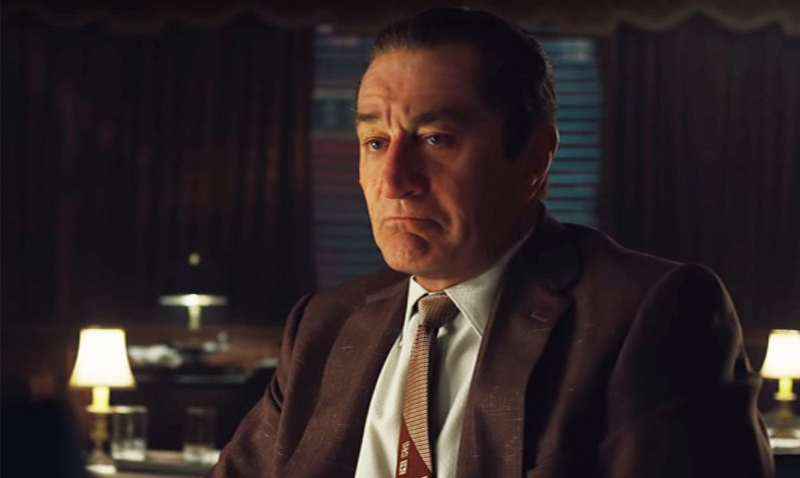Thanks to the wondrous age of technology we live in, the line between movies and television is blurrier than ever. The difference between what constitutes a “theatrical release” and a “made-for-TV movie” barely exists in our world of digital streaming. Netflix and Amazon are frequently putting their high-profile films in theaters for short runs a week or two before the films hit home streaming services. This allows them to be considered for Oscars and bestows a certain credibility on the work. Recently, the United States Department of Justice announced that it would be allowing the old “Paramount Consent Decree” to expire. That 1948 antitrust case prevented movie studios from owning the movie theaters in which their product screened. Now, they can—which means far more for Netflix than it does for Paramount. Within 5 years, you can reasonably expect to start using your Netflix membership to go see Netflix movies at the local Netflix movie theater.This brings us to The Irishman, the latest feature from celebrated filmmaker Martin Scorsese. The National Association of Theater Owners recently balked at Netflix’s plan to release the film (which it produced) to home video streaming a week after its premiere in cinemas. (Theater circuits prefer at least a 72-day “window” between movie theaters and home video of any sort.) With major theater chains against it, The Irishman managed to see the light of day on less than a dozen screens nationwide—an ignominious hallmark for a Scorsese film. What this ultimately says about the future of filmmaking, movie studios and cinemas in America remains to be seen. If you don’t live in one of the handful of cities that played The Irishman (Santa Fe’s Violet Crown Cinema managed to get hold of it), the only way you can see it is to be a Netflix subscriber. Scorsese’s sprawling, 3-hour-and-29-minute epic is based on Charles Brandt’s controversial 2004 work of nonfiction I Heard You Paint Houses. The book is the confessional story of Frank Sheeran, an alleged mafia hitman who says he murdered Jimmy Hoffa while working for the Bufalino crime family. Plenty of people have disputed Sheeran’s story. (Sheeran passed away in 2003.) But that’s of no real concern to anyone watching this sweeping crime drama. Sheeran is played here by Scorsese mainstay Robert De Niro. After looking in on Sheeran as a frail old man in a retirement home, the film skips back to the 1950s when a young Sheeran (played by De Niro through some computer-assisted de-aging trickery) is working as a truck driver out of Philadelphia. After helping some mobster get access to a few slabs of beef that “fell off” his truck, Sheeran finds his himself climbing up the ranks of the East Coast mob family. He falls under the wing of quiet criminal kingpin Russell Bufalino (Joe Pesci, also given the de-aging assist). Given Sheeran’s background as a “good soldier” in WWII, he quickly proves himself adept at following orders and—when circumstances require (which is often)—killing people.At 219 minutes, The Irishman is in no particular rush to tell its story, which spans a good 50 years of Frank’s storied life. Patiently—over the course of our comfortably amoral protagonist’s winding tale of family, friends, career and crimes—Scorsese paints a picture of mid-century America as seen through the lens of the mob. We get JFK’s assassination, the Bay of Pigs, Bobby Kennedy, Richard Nixon, Watergate. And of course, we get hints of the mafia’s connection to it all as shapers of modern industry, society and politics.De Niro and Pesci get the most screentime, and their friendship is central to the film’s various moral twists. The digital tweak to the actors’ physiques is impressive and largely seamless. (Weirdly, the first time both appear on screen, it’s glaringly obvious—both look like bobbleheads made of PVC. But after that rocky introduction, the technology improves greatly.) De Niro carries the film, of course. But Pesci, returning from a long cinematic absence, does some of his finest work on screen. Also along for the ride is Al Pacino, who finds an appropriate outlet for his acting bombast in the form of outspoken union leader Jimmy Hoffa. Though long and slow, The Irishman is a consistently absorbing drama about one man’s life in crime. Ultimately—as the decades change, the law cracks down, his friends die off, and our protagonist surrenders to the cruelties of age—the film has something rather poignant to say on the subject of loyalty. Secretive criminal organizations like the mafia are very big on loyalty. But what should a man really remain loyal to: His country, his job, his friends, his family? For all its focus on one man’s misdeeds (real or conflated), The Irishman isn’t a romanticization of the gangster lifestyle. Almost every time we meet a new character in the film, Scorsese pops up some titles letting us know where and when this person met their untimely end, and by how many bullets. As a result, this Netflix epic serves as an elegiac capper to the mafia myth, to Scorsese’s career and (just maybe) to the life span of the American movie theater.
The Irishman is available for streaming now on Netflix.

